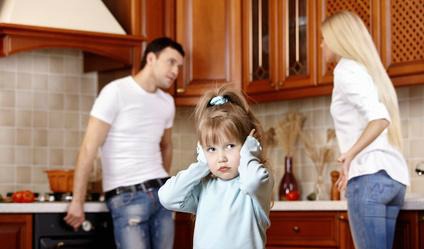|
|
How Divorce Affects Children Can Depend on How You Communicate With Them

We all know that divorce affects children in a myriad of ways . . . changes in how they interact with you, how they feel, how they live, not to mention the long-term implications of this life upheaval.
One key to helping your children cope with your divorce or separation is to maximize communication and provide the best tools for your family to work through the changes.
Children are often confused and experience mixed emotions when their parents divorce. They may not have the ability to understand why things have to be this way. As parents, you need to have a clear understanding of the reasons for the divorce or separation and clarify these reasons to the children in an age-appropriate way.
How parents act during this time has vital implications for the emotional
well-being of their children. Give your children a means to be heard, through
family discussions or family or individual counseling, if appropriate. You may
not solve all of a child’s issues about your parting, but it’s a solid starting
point to do the best you can do for your kids.
If it’s possible in your situation, work with your ex and agree beforehand how you’re going to explain things to the children and give this explanation together. Allow plenty of opportunity for questions, even if the questions are uncomfortable. Talk about how life is going to change, why it will be better even though it hurts and how you’re both going to help the kids move forward.
One approach to dealing with how divorce affects children is to raise the topic of whether your kids have friends whose parents have split. What impressions and ideas have your kids formed about how divorce affects children? What have they learned about this scenario? While everyone’s situation will be somewhat different, your child may have preconceived notions about it and as parents you should focus on how your situation will be and how it will impact the kids.
Let your children express their concerns and ask their questions. Address topics like how much time will be spent with each of you, does the child have a voice in how much time they spend with each parent, where will everyone live, how will a new partner (if there is one) fit into their lives. Confirm the reasons for your separation or divorce. Your children may well have noticed things weren’t “right” between you, but again, their perceptions may be different than your reality.
Hit the topic of whether or not you’ll get back together head on. Be honest about this possibility so your kids aren’t encouraged to hold onto this hope if there’s no chance of things going back to the way they were.
By communicating and listening, you
can learn how divorce affects children–your children–and what you and you ex
can do to map out the best path. Your children’s responses can be useful in
helping all of you move on and find the techniques that will most effectively
help your children cope. You can uncover layers of meaning that will lead to
building solutions to issues and problems.
As you become less self-centered and tied up in the divorce, you will free up
more solution building opportunities. You can find the best ways to figure out
how divorce affects children–your children–and promote optimal emotional
healing and well-being.
Visit these pages for more information:
Are Rebound Relationships After Divorce Right For You?
Minimizing Divorce Affects on Children
Recovery from Divorce Means Focusing on You
Divorce Advice for Men Can Help You Survive This Major Life Change
Marriage Separation Help For Parents
Return to Relationship Advice Home
Recent Articles
-
Tips For Resolving Marriage Conflict
Collaborative marriage techniques can help resolve marriage conflict. Click here to read more . . . -
Marriage Tips Help Solve Marriage Problems
Is your marriage perfect? Need a few pointers to help smooth over the rough spots? Read our article on marriage tips. -
Can You Save A Marriage? Useful Tips And Suggestions
Can you save a marriage? Here's some advice . . .




